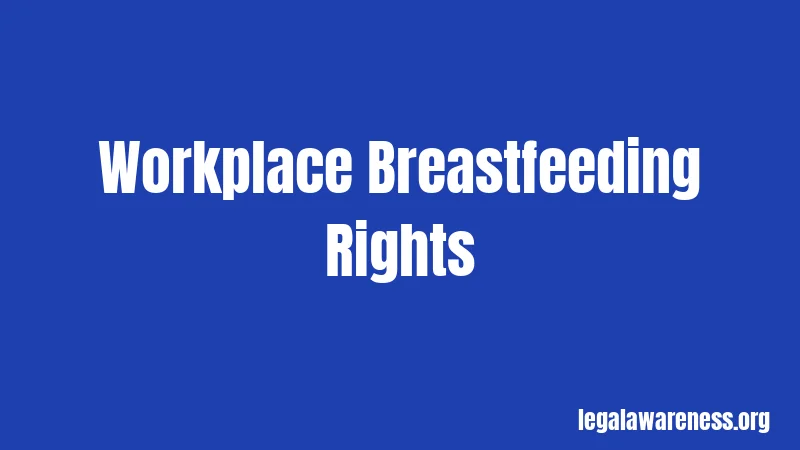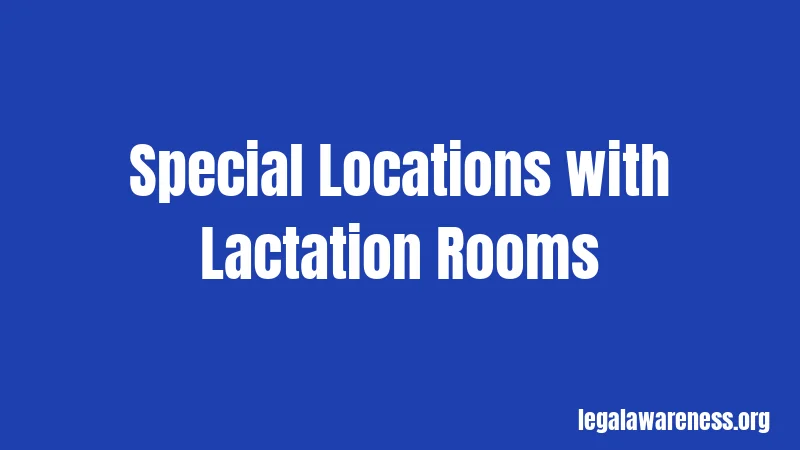Breastfeeding Laws in Illinois (2026): Your Complete Protection Guide
Most people don’t realize just how strong breastfeeding protections are in Illinois. Seriously. The state has some of the best laws in the country for nursing mothers. Whether you’re at work, at school, or just out grabbing coffee, Illinois law has your back.
Let’s break down exactly what rights you have and how these laws protect you.
What Are Breastfeeding Laws?

Breastfeeding laws protect your right to nurse or pump breast milk. They cover where you can breastfeed and what your employer must provide. These laws exist because breast milk offers better nutrition and health benefits for babies.
Illinois recognized this back in 2004 with the Right to Breastfeed Act. The state has been adding protections ever since. Pretty straightforward.
Your Right to Breastfeed in Public
You can breastfeed anywhere you’re legally allowed to be. Restaurants. Parks. Stores. Your workplace. Museums. Literally anywhere.
The law says you don’t need to cover up either. Some people might not know this, but using a cover is completely optional. It’s your choice.
There’s one exception though. If you’re in a place of worship, you should follow that specific location’s norms. Makes sense, right?
Public Indecency Laws Don’t Apply
Here’s something important. Illinois law specifically states that breastfeeding is NOT public indecency. This has been law since 1995.
Some police officers don’t know this. Honestly. There have been cases where officers tried to arrest women for breastfeeding. But the law is crystal clear on this point.
Can You Sue If Someone Stops You?
Yep, you can. If someone denies your right to breastfeed in a public or private location, you can take legal action. Not in private homes or places of worship though.
If you win your case, you get your attorney’s fees paid. You also get litigation expenses covered. The law is designed to protect you.
Workplace Breastfeeding Rights

Illinois workplace laws go beyond federal protections. Way beyond. The state requires employers with more than five employees to support nursing mothers.
Hold on, this part is important. Starting January 1, 2026, your pumping breaks must be PAID. This is huge.
What Your Employer Must Provide
Your employer has to give you break time to pump. This break time can overlap with your regular breaks. But they can’t make you use vacation time or sick leave for pumping breaks.
You also get a private space. Not a bathroom. A real room or area where you can pump in private. Your employer must make a reasonable effort to provide this space near your work area.
The space doesn’t have to be fancy. But it should be clean, private, and not a toilet stall.
How Long Do These Rights Last?
You have these workplace protections for one year after your baby’s birth. That’s 12 full months of legally protected pumping time.
Starting in 2026, employers must pay you for 30 minutes of pumping time each session. This time gets paid at your regular rate. No exceptions unless it creates an “undue hardship.”
What If Your Employer Says No?
Some employers claim providing pumping accommodations creates an undue hardship. This is rare though. Like, really rare.
An undue hardship means it’s prohibitively expensive or disruptive. The law considers the employer’s financial resources and size. Most employers can easily provide these basic accommodations.
Wondering if this applies to you? If your employer has six or more employees (not counting immediate family members), then yes. You’re covered.
Protections for Students
Public schools and charter schools must accommodate lactating students. This includes high schools. Seriously.
Students get access to a private room. Not a bathroom. A real space with privacy. Schools must also let students bring breast pumps to campus.
Making Up Missed Work
Schools can’t punish you for pumping. They must give you time during the school day. And you get to make up any work you miss.
This is especially important for new moms trying to finish their education. The law recognizes that students need these protections too.
Special Locations with Lactation Rooms

Illinois requires certain public places to have dedicated lactation rooms. These spaces go beyond just allowing breastfeeding.
Airports
Major airports must provide lactation rooms. We’re talking about airports with more than 1 million passengers per year. The room must be behind the security screening area in every terminal.
Each lactation room needs a chair and an electrical outlet at minimum. It has to be outside of a restroom. Chicago airports actually had this requirement a year before the state law passed.
Courthouses
Every building that houses a circuit court must have a lactation room. This has been required since June 1, 2019.
The room must include a chair, a table, and an electrical outlet. When possible, it should also have a sink with running water. Again, it can’t be inside a bathroom.
State Government Buildings
The State Capitol Building has designated lactation rooms. So do the Howlett Building and the Stratton Building. These were added in 2018.
Jury Duty Exemption
Nursing mothers can be excused from jury duty. You just have to request it. This has been law since 2005.
It’s automatic. If you’re nursing your child and you get called for jury duty, just let them know. You’ll be excused.
Resources and Support Programs
Illinois offers several programs to support breastfeeding mothers. You don’t have to navigate this alone.
WIC Program
The Women, Infants, and Children (WIC) program provides lactation support. Many WIC agencies have certified lactation consultants on staff. They’re nurses, social workers, or case managers.
WIC can also help you get a breast pump. If you can’t get one through Medicaid or insurance, WIC might provide or rent you one. The type of pump depends on your situation.
WIC staff actually calls mothers during their last 30 days of pregnancy. They answer questions and provide breastfeeding support information. Pretty helpful.
Hospital Support
Hospitals with birthing services must have an infant feeding policy. This policy has to promote breastfeeding. Hospitals must communicate this policy to staff regularly.
Some hospitals also post their feeding policies on their websites. This helps families know what support they’ll receive.
Breastfeeding Task Force
Illinois has a State Breastfeeding Task Force. Their goal is making breastfeeding the cultural norm. They work to remove barriers and support families.
The task force focuses on creating environments where all families can breastfeed successfully. They look at home life, work, and healthcare settings.
What Happens If Your Rights Are Violated?
You have options if someone violates your breastfeeding rights. Don’t worry, we’ll break it down step by step.
At Work
If your employer denies you pumping breaks or a private space, you can file a complaint. Illinois has the Human Rights Act that covers pregnancy discrimination. This includes lactation accommodations.
Employers with one or more employees are covered under this Act. The employee must have worked at least 20 calendar weeks in Illinois.
You can contact the Illinois Department of Human Rights. They investigate discrimination complaints. You might also want to talk with an employment lawyer.
In Public Places
If someone kicks you out for breastfeeding, document everything. Write down what happened. Get witness names if possible.
You can file a lawsuit to prevent future denials. If you win, you get attorney’s fees and litigation costs covered. This makes it easier to take legal action without worrying about expenses.
At School
Students should talk to school administrators first. Schools must have grievance procedures for lactation accommodations. If that doesn’t work, contact the Illinois State Board of Education.
Employer Requirements Starting 2026
Here’s where it gets interesting. The new paid break law changes things significantly.
Paid Break Time Details
Effective January 1, 2026, nursing mothers receive 30 minutes of paid break time. Each pumping session. For up to one year after birth.
This time must be paid at your regular rate. Not minimum wage. Your actual hourly rate. Employers can’t make you clock out.
The only exception is undue hardship. But remember, that’s rare and hard to prove.
No Compensation Reduction
Employers cannot reduce your pay for pumping time. They never could under Illinois law. But the 2026 changes make this even clearer.
You shouldn’t see any difference in your paycheck. Your employer can’t dock your pay or make you use paid time off.
Rights for Different Types of Workers
Not sure what counts as a violation? Let me break down how these laws apply to different situations.
Full-Time Employees
If you work full-time for an employer with six or more employees, you’re definitely covered. You get all the protections we’ve discussed.
This includes break time, private space, and starting in 2026, paid pumping time. Your employer must comply unless they can prove undue hardship.
Part-Time Employees
Part-time workers have the same rights. The law doesn’t distinguish between full-time and part-time employees.
As long as you work for a covered employer, you get the same accommodations. Simple as that.
Temporary or Seasonal Workers
Temporary and seasonal employees are covered too. The law says “currently works for pay in the state of Illinois.”
You also qualify if you have the right to return to a position after leave. This covers maternity leave situations.
Cannabis Warning for Nursing Mothers
Illinois requires warning labels on adult-use cannabis products. These warnings specifically tell pregnant and breastfeeding people not to use cannabis.
This became law in 2019. The state takes seriously the potential effects of cannabis on breast milk. Just something to be aware of.
Department of Corrections Facilities
Employees who work at Department of Corrections facilities have special protections. Each facility that employs nursing mothers must provide a lactation room.
These rooms need specific features. A locking door. An “occupied” sign. Outlets and comfortable chairs. A table or countertop. Refrigerator and waste basket. Chemical cleaners and a sink.
The rooms must have good lighting and ventilation. They also require daily maintenance.
How to Talk to Your Employer
Okay, pause. Read this carefully. The way you approach your employer matters.
Before You Return to Work
Start the conversation before you come back from maternity leave. Email your supervisor or HR department. Put it in writing.
Explain when you’ll need pumping breaks. Ask about available private spaces. Be specific about what you need.
What to Say
Keep it professional but clear. You might say something like: “I’ll need to pump breast milk during work hours for the next year. Illinois law requires employers to provide reasonable break time and a private space. Can we discuss the accommodations available?”
Most employers will work with you. Honestly. They’d rather accommodate you than face legal issues.
If They Refuse
Document the refusal in writing. Follow up your conversation with an email summarizing what was said. Keep copies of everything.
Then contact the Illinois Department of Human Rights. You can file a complaint. You might also want to consult an employment attorney.
Breastfeeding vs. Pumping
Sound complicated? It’s actually not. The law treats breastfeeding and pumping the same way.
Whether you’re directly nursing your baby or pumping milk, you have the same protections. The accommodations apply to both.
Some mothers do both. They nurse at home and pump at work. That’s completely normal and fully protected.
FAQs About Illinois Breastfeeding Laws
Can my employer fire me for taking pumping breaks?
No. Firing you for exercising your legal right to pump would be discrimination. This violates Illinois law and could result in a lawsuit against your employer.
Do I need to give advance notice to my employer?
The law doesn’t require advance notice. But it’s smart to communicate your needs early. This gives your employer time to arrange accommodations.
What if there’s no private room available at my workplace?
Your employer must make a reasonable effort to provide space. This might mean converting a storage room or using a temporarily vacant office. They have to try unless it creates undue hardship.
Can I breastfeed in a restaurant without being asked to leave?
Absolutely. Illinois law protects your right to breastfeed anywhere you’re allowed to be. A restaurant can’t ask you to leave or move to a bathroom.
Are babysitters or nannies covered by workplace pumping laws?
It depends. If they work for an employer with more than five employees, yes. Individual families hiring one nanny typically aren’t covered as “employers” under this specific law.
Final Thoughts
Illinois takes breastfeeding protection seriously. The state has built strong laws that support nursing mothers at work, school, and in public.
Starting January 1, 2026, these protections get even better with paid pumping breaks. That’s a huge win for working mothers.
Know your rights. Use them when you need to. And don’t be afraid to speak up if someone tries to deny you these protections.
Stay informed, stay confident, and remember, the law is on your side.
References
- Illinois Right to Breastfeed Act – 740 ILCS 137 (2004) – https://www.ilga.gov/legislation/ilcs/ilcs3.asp?ActID=2429
- Illinois Nursing Mothers in the Workplace Act – 820 ILCS 260 (2001, amended 2018, 2025) – https://www.ilga.gov/
- Illinois Department of Human Services – Breastfeeding Laws – https://www.dhs.state.il.us/page.aspx?item=161203
- Illinois Legal Aid Online – Breastfeeding Rights – https://www.illinoislegalaid.org/legal-information/breastfeeding-what-are-my-rights
- Illinois Public Indecency Statute – 720 ILCS 5/11-30 (1995) – Clarifies breastfeeding is not public indecency
- Senate Bill 212 (2025) – Paid Lactation Breaks – Effective January 1, 2026
- Lactation Accommodation in Airports Act – 410 ILCS 140 (2015) – https://www.ilga.gov/legislation/ilcs/ilcs3.asp?ActID=3650
- Illinois Human Rights Act – 775 ILCS 5/2-102 (1991) – Defines reasonable accommodations for lactation
